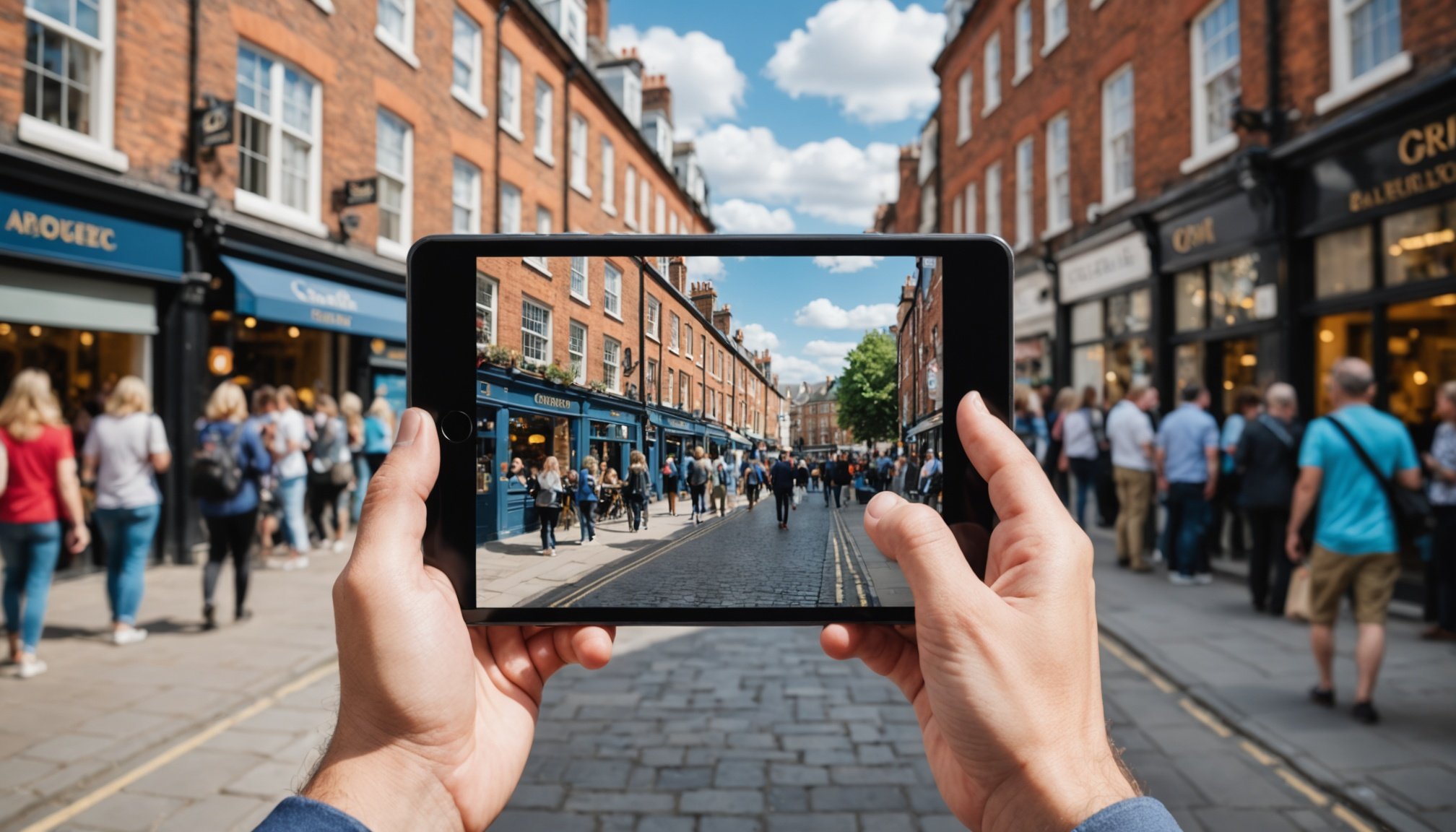Overview of Augmented Reality in UK Tourism
Augmented Reality (AR) has emerged as a pivotal technology within the UK tourism sector, transforming how visitors engage with destinations. Unlike virtual reality, which creates an entirely artificial environment, AR overlays digital information onto the real world, enriching the visitor’s surroundings with interactive content. This is particularly significant in UK tourism, where AR has the potential to breathe new life into historical sites and cultural landmarks.
Recently, there has been a surge in the adoption of AR technologies across various tourism venues in the UK. Museums are incorporating AR to offer immersive narratives, while city tours are leveraging this technology for enriched and informative routes. The integration of AR in theme parks and attractions has enhanced visitor engagement, making the overall experience more appealing.
Also to see : Boosting UK Startups: Leveraging Co-Working Spaces for Ultimate Networking and Collaboration
Economically, AR has contributed to increased tourism revenues by drawing more visitors and providing unique experiences that stand out in the competitive tourism market. Investment in AR technologies is proving to be a viable strategy for boosting visitor numbers and enhancing the appeal of destinations. By keeping up with these trends, UK tourism can maintain its competitive edge on the global stage.
Key Applications of Augmented Reality in Enhancing Visitor Experiences
Augmented Reality (AR) applications are revolutionising visitor experiences throughout the UK’s tourism sector. This transformative technology offers a wide array of possibilities, particularly in interactive tourism. Let’s explore how AR fosters unique experiences across various attractions.
Also to discover : Sustainable Style: Leading Tactics for UK Fashion Brands to Embrace Eco-Friendly Fabrics
Museums and Historical Sites
Museums leverage AR for immersive storytelling, offering narratives that bring history to life. Visitors can engage with interactive exhibits, displaying artefacts in fascinating details. For instance, AR apps might allow users to see historical buildings reconstructed in their original state. This not only enriches understanding but significantly boosts visitor engagement.
AR-based City Tours
City tours across the UK are starkly enhanced with AR, enabling a more informative exploration of urban landscapes. AR overlays historical facts and trivia onto real-world locations, guiding tourists through a virtual narrative with interactive features. This makes cultural sightseeing more engaging and insightful.
Theme Parks and Attractions
In theme parks, AR is used to create immersive attractions that captivate visitors. Through AR glasses or apps, tourists can experience augmented environments that blend seamlessly with real-world settings, enhancing overall experience. Notable theme parks are utilising AR to attract wider audiences by offering experiences that stand out.
Benefits of Augmented Reality for Tourists
Augmented Reality (AR) provides numerous benefits for tourists, greatly enhancing their travel experiences in the UK. Interactivity is significantly increased as AR allows tourists to engage with their surroundings in dynamic ways. For example, users can interact with digital overlays at historical sites or landmarks, enriching their understanding of the location.
Personalization is another key advantage of AR, as it caters to individual tourist preferences and needs. Visitors can customise their AR experiences by choosing specific themes or areas of interest, tailoring the content to suit personal tastes. This offers a more meaningful and satisfying exploration of attractions.
Furthermore, AR improves accessibility by providing supportive features for diverse audiences. For visitors with disabilities, AR can offer alternative methods of accessing information or navigating spaces. For example, audio descriptions and interactive guides ensure that all tourists can fully enjoy their visits.
In summary, AR not only boosts tourist engagement by making visits more interactive and personal but also broadens the accessibility of tourism experiences. This ability of AR to transform tourism makes it an invaluable tool in enhancing the overall visitor experience.
Expert Opinions on the Future of AR in UK Tourism
With Augmented Reality (AR) at the helm of innovation in UK tourism, experts foresee significant advancements in visitor engagement and tourism innovation. Industry leaders assert the importance of continual innovation to keep up with evolving traveller preferences. Notably, they predict that AR will increasingly intertwine with emerging technologies like AI, allowing for more personalised and interactive experiences.
There is consensus on the need for a robust AR strategy to maintain the sector’s competitiveness. As AR technologies become more affordable, and user-friendly, their adoption is expected to soar. This shift underpins the broader trend towards digital transformation in tourism, driven by the demand for unique visitor experiences.
However, potential challenges require attention. Experts highlight concerns about data privacy and the digital divide, which may hinder equal access to AR experiences. To mitigate these issues, transparent policies and inclusive strategies must be developed.
In conclusion, tourism stakeholders remain optimistic. With AR and related technologies set to redefine tourism innovation, the future of Visitor Engagement in the UK looks promising, fostering sustainable growth and enriched visitor experiences.
Statistical Insights on AR Usage in UK Tourism
In the realm of UK tourism, Augmented Reality (AR) has demonstrated remarkable growth over recent years. The adoption of AR technologies by tourist organisations is on an upward trajectory. Recent data indicates that nearly 45% of UK-based travel companies are currently integrating AR into their services, a significant increase from past figures.
Visitor engagement metrics showcase the benefits of this growth. There has been a documented rise of approximately 30% in visitor satisfaction scores following AR implementations at tourism sites. This indicates a clear link between AR usage and enhanced visitor engagement, as tourists enjoy enriched and interactive experiences.
Looking forward, experts predict a continued surge in AR growth within the tourism sector. Simulation models suggest that AR applications could double in use over the next decade. This rapid expansion is driven by increased investment and consumer demand for innovative experiences. As AR technology becomes more widespread, its potential to shape the future of tourism remains immense. Significantly, its influence extends beyond enhancing visits—AR is paving the way for future engagement strategies that redefine the visitor experience.
Case Studies of Successful AR Implementations
Augmented Reality (AR) has made significant strides in the UK’s tourism landscape, as evidenced by successful case studies that showcase its potential. Historical London seamlessly integrates AR to enrich tourist experiences with unique storytelling elements. Visitors can explore iconic sites like the Tower of London, using AR to visualise historical events and reconstructions, thus providing a deeper understanding of the past.
In Edinburgh, Virtual Reality Tours offer tourists an immersive journey through the city’s rich heritage. By combining VR with augmented reality, users can engage with interactive narratives that bring historical figures and events to life. This approach not only captivates visitors but also sets a benchmark for virtual tour experiences.
Across various UK attractions, innovative AR experiences have redefined visitor engagement. Notable theme parks are implementing AR to deliver attractions that blend digital content with physical surroundings. These augmented environments captivate audiences through interactive features and personalised narratives, enhancing the overall visitor experience.
These case studies highlight the successful implementation of AR, serving as best practices for future tourism innovations. By keeping attuned to technological advancements, the UK tourism industry continues to set the stage for extraordinary visitor experiences.
Conclusion: The Future of Visitor Engagement through Augmented Reality
Augmented Reality (AR) continues to reshape the visitor experience landscape within the UK tourism industry. Its transformative impact is evident as AR not only enhances visitor engagement but also revolutionises how tourists interact with attractions. As AR technologies evolve, these advancements promise to sustain the growth of visitor engagement strategies.
Looking ahead, the integration of AR in tourism is poised to deliver lucrative long-term benefits. Tourism stakeholders anticipate that, by leveraging AR innovations, they can attract and retain more visitors. This adoption could lead to increased tourism revenues, securing the UK tourism sector’s competitive edge globally.
The ongoing evolution of AR suggests that more immersive and interactive experiences will become standard, elevating the overall appeal of destinations. This progression supports the tourism sector’s need to continually adapt to the changing technological landscape to meet rising consumer expectations.
In summary, the future of AR in tourism holds immense potential for redefining the tourist journey. With its continued development, AR will play a critical role in enhancing the visibility and attractiveness of UK tourism offerings.











